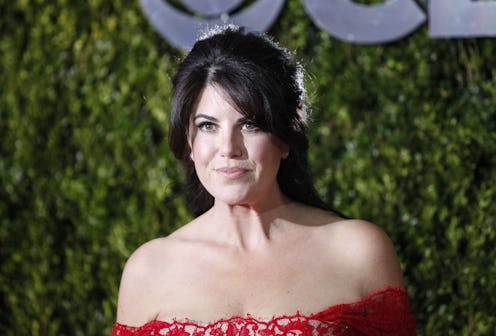News
Monica Lewinsky On Bullying and Shaming
Nearly two decades after she was thrown into the national spotlight for, well, you know, Monica Lewinsky is finally starting to make a reputation for herself that has absolutely nothing to do with the Clintons. In 1998, Lewinsky went from a private figure to one of the most hated people in America almost overnight. During her federal investigation, she was chastised by the media and forced to recall the lurid details of her affair with the president over and over. Although at one point it might have seemed that nothing good could have come from a big mistake she made in her 20s, Lewinsky is now an outspoken advocate for people who have been publicly shamed. In a rare interview, Monica Lewinsky opened up to The Guardian about public shaming and bullying, and we can learn a lot from her experience.
"I felt like every layer of my skin and my identity were ripped off of me in '98 and '99," Lewinsky told journalist Jon Ronson, author of the book So You've Been Publicly Shamed. "It's a skinning of sorts. You feel incredibly raw and frightened. But I also feel like the shame sticks to you like tar."
Lewinsky said that for years she had trouble getting a job. Her reputation preceded her, and apparently could successfully trump the qualifications she gained from a graduate degree in social psychology from the London School of Economics. It was time for her to change the conversation. So in 2014, she penned an essay for Vanity Fair called "Shame and Survival," which detailed her years as a recluse and called out the feminists who joined in her public shaming.
Since she spoke out, Lewinsky has continued her anti-bullying advocacy by speaking to groups around the country. She told The Guardian that she has partnered with Vodafone to create a keyboard of anti-bullying GIFs and emojis, which she intended to be a helpful tool for bystanders who witness online bullying.
Lewinsky said that her work has started to resonate with others, and often has people who have been shamed approach her in public to share their stories. "Sometimes they'll say, 'I went through this, but it's nothing like what you went through.' But I tell them that, if I drown in 60 feet of water and you drown in 30 feet, we both still drowned. You either know what it's like to be publicly shamed or you don't."
She also has some advice for people who witness public shaming, who often might feel that they should take action: "Don't bully the bully. It doesn't move the conversation forward."
Lewinsky undoubtedly has suffered, but it seems that, at the very least, her trials can serve as not only as a personal lesson, but one that many other people can learn from. She had no personal obligation to become an advocate, but she's turned an awful ordeal into an inspiring tale.
